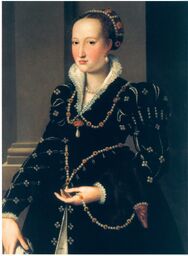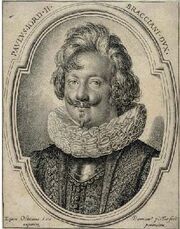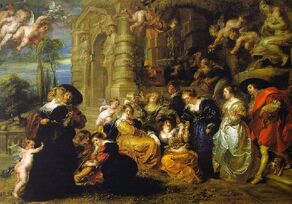The White Devil is a revenge-tragedy written by John Webster. The play made its first debut in England in 1612.

Isabella Medici
The play centralizes on the issues of deception, individualism, misogyny, social status, appearances, and the medieval values. The play was based on a true story of Vittoria Accoramboni murder in Padua on December 22nd

Son of Bracciano and Isabella
1585. The main characters are historically based as well. Bracciano is Paola Giordano Orsini and was married to Isabella, who is based on Isabella de’ Medici. The Medici was at the time the most powerful family in Rome. Bracciano fell in love with Vittoria despite his marriage with Isbella. Fear that Camillo, Vittoria’s husband, and Isbella will harm his mistress, Bracciano murdered them. Vittoria’s brother Flamineo who was working for Bracciano used this as an opportunity to climb the social ladder; he helped Bracciano with his murderous plan. A women’s virtue is subjected to her loyalty to her husband. Vittoria was condemned as a whore whilst Isabella a martyr. But despite the ways society perceives them, these two women were both victims of mens' lust and desire. The White Devil not only depicts the consequences for infidelity, it depict a place where fame and fortune controls the mindset of the people.
Summary of Act 5, Scene 4[]
Giovanni is the son of Bracciano and Isabella, the new Duke.
Flamineo is the brother of Vittoria and Marcello. Marcello was killed by Flamineo during a quarrel when Marcello condemned his brother’s affair with Zanche, their servant.
Cornelia, clearly somewhat insane, is murmuring distractedly about flowers for Marcello's grave. She does not recognize Flamineo, although she does call him the "grave-maker," a pun on grave-digger and murderer. She sings a song over Marcello's body in an attempt to bless and protect his grave. She then leaves with the rest of the women, and Flamineo asks Francisco to le

Depiction of The White Devil
Cornelia is the mother of Flamineo, Vittoria and Marcello. She disapproved of her daughter’s relationship with Bracciano and secretly cursing them and her family. Marcello death was to her a great shock. Afterwards she does not recognize Flamineo and seems to be a little bit insane.
After Cornelia exit the room, Flamineo encountered Bracciano’s ghost.
“Suddenly, Brachiano's ghost appears, holding a pot of lilies with a skull buried beneath them. Flamineo unleashes a flurry of questions to the ghost, questioning what hell is like and whether Flamineo will also soon die. The ghost remains silent, but throws dirt on Flamineo, revealing the skull underneath the lilies. Frightened by all the misfortune around him, Flamineo runs off to kill his sister, hoping that will resolve everything.” (Gradesaver)
Connection to The Waste Land []
Line 74 is a direct quote in Act 5, Scene 4 of the White Devil, when Cornelia sings to her dead son Marcello who was killed by her other son Flamineo.
Call for the robin redbreast, and the wren,
Since o’er shady groves they hover,
And with leaves and flowers do cover
The friendless bodies of unburied men.
Call unto his funeral dole
The ant, the fieldmouse, and the mole,
To rear him hillocks that shall keep him warm,
And (when gay tombs are robb’d) sustain no harm;
But keep the wolf far thence, that ’s foe to men,
For with his nails he ’ll dig them up again.
They would not bury him ’cause he died in a quarrel;
Marcello was refused a proper burial because he died in a quarrel. His body now lay underneath the dirt without the confinement and the protection of the church. Cornelia’s song is suppose to sooth her son’s soul. She says that the leaves and the flowers will cover his grave, and the birds and rodents will protect his body and keep him warm. He will one day become one again with the earth. His body will be feed the ground and life will sprout again. But she warns that his grave must not be touch by the wolf because it will disturb his bed and his rebirth will be disrupted.
In The Waste Land Eliot replaced "wolf" with "dog" to make the setting more modern but he also replaced "friend" with "foe". The act of digging up the grave then is welcomed in The Waste Land, the regeneration should be disturbed and live should not spring again.